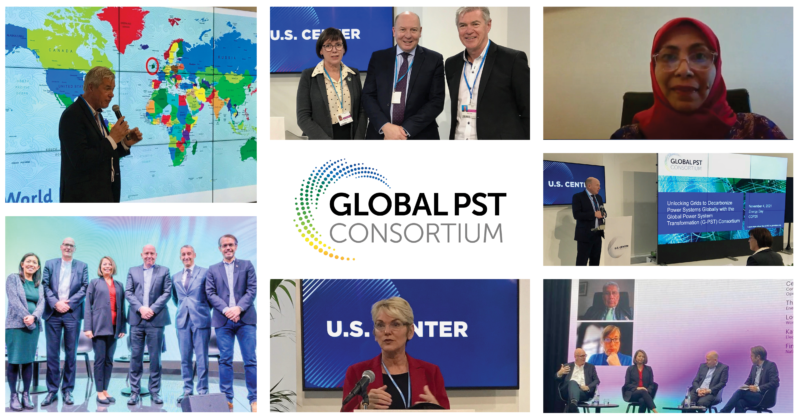This quarterly newsletter highlights recent projects, partnerships, and resources from the Global Power System Transformation (G-PST) Consortium.

Karin Wadsack
I joined the G-PST Consortium team about a month ago as the director of its secretariat, based out the National Renewable Energy Laboratory (NREL). I’d been impressed with the G-PST and its mission since I first learned about it and am thrilled to have the opportunity to come on board. The work G-PST is tackling has never been more important, and as 2021 comes to a close, it’s a particularly opportune time to appreciate the hard work that went into all the progress this consortium made over just a few short months. Special thanks go to the leadership of our core team, the championing CEOs of our founding system operators, and the system operator partners and staff we are collaborating with all over the globe.
Looking forward, we are excited to build off the foundational work that has taken place in the last year developing the solid 5-pillar organization, defining our governance structure, and creating the mechanisms for tracking and understanding the reach of our audience and impact of our research and technical support accomplishments. Next year, we will be implementing several cross-pillar collaborations through our standards work in Pillar 4, continuing pursuit of our research agenda in Pillar 1, helping scale power system decarbonization efforts in the emerging economies engaged with G-PST through Pillar 2, advancing strong work to broaden women’s leadership in power systems transformation with Pillar 3, and increasing the development and deployment of open tools for power systems management in Pillar 5. If you have ideas, opportunities, or questions, I’d love to hear from you – please don’t hesitate to reach out to globalpst@nrel.gov.
Wishing you all a wonderful holiday season and year’s end.
Best,
Karin Wadsack
Director – G-PST Consortium Interim Secretariat

Members of the G-PST’s founding system operator group, as well as other energy sector leaders, came together, virtually and in-person, for several events at COP26.
G-PST Consortium Represents Power System Progress at United Nations Climate Change Conference
The 2021 United Nations Climate Change Conference (COP26) provided an opportunity to renew the global effort to identify and implement solutions to decarbonize power systems at the urgent pace necessary to combat the effects of climate change. The G-PST Consortium and its partner organizations were honored to participate in the conference, both virtually and on the ground in Glasgow, by hosting events and developing resources that emphasize the need to support power system operators along the clean energy transition journey through partnership, innovation, and education. Explore the G-PST’s COP26 programming below:
Unlocking Grids to Decarbonize Power Systems Globally: This U.S Center event brought together power sector leaders from the U.S. and U.K., in addition to system operator leaders from Indonesia, California, Germany, Ireland, and Australia, to introduce the G-PST Consortium and its mandate, supporting power system operators in managing clean, reliable, affordable grids, to a global audience. The event also highlighted the G-PST Consortium’s tangible progress since its April 2021 launch and premiered a new initiative, funded by the U.S. Agency for International Development (USAID), focused on promoting opportunities for women in power system operations careers.
Transforming the Grid: Personal Experiences: In this pre-COP event hosted by G-PST’s Pillar 1 lead organization, the Energy Systems Integration Group (ESIG), attendees heard from system operators who are bending the limits of what was previously thought possible with high penetration renewable energy grid operation. Leading system operators shared techniques they use to manage grid frequency and strength, while system operators in countries at earlier stages of renewable energy integration shared plans they are taking to avoid locking in emissions from additional fossil fuel-based generators. By using the lens of individual stories, the session humanized technical topics and shared the triumphs, setbacks, and excitement of one of the greatest technical endeavors of the current era.
Policy Brief: The Intersection of Resource Adequacy and Public Policy: Resource adequacy represents a potential short-term pitfall for ambitious clean energy targets globally. In anticipation of COP26, ESIG’s Resource Adequacy Task Force, with substantial input from subject matter experts from several of the G-PST Consortium’s founding system operators, prepared a brief to support the policy community by offering guidance on managing resource adequacy as the power system transforms.
Accelerating Power System Transformation through Technical Innovation: In partnership with Accenture, the G-PST Consortium co-hosted an event outlining how human ingenuity and collaboration can combine with innovative technology to overcome the operational challenges associated with operating high renewable energy grids. The event included speakers from G-PST partner organizations National Grid Energy System Operator (ESO), Australian Energy Market Operator, Energinet, COES Peru, and the Electric Power Research Institute, as well as representatives from the World Economic Forum, Accenture, and Reactive Technologies.
 Women in Power System Transformation Initiative Launches to Promote Gender Diversity in System Operations Workforce
Women in Power System Transformation Initiative Launches to Promote Gender Diversity in System Operations Workforce
In collaboration with the USAID-NREL Partnership, the G-PST Consortium launched a program to advance USAID’s work focused on enhancing women’s economic empowerment and gender equality efforts in the power sector. Called “Women in Power System Transformation”, this program will provide in-depth technical capacity building for women in emerging economies so they can excel in science and engineering professional roles in the rapidly evolving power sector. In partnership with industry and academic institutions, the technical education and training offered will include university-level engineering degree programs and on-the-job training on operational and engineering grid integration approaches. Both fellowship and internship opportunities will be tailored and promoted to encourage the maximum participation of women, paving the way for women to lead the power sector’s clean energy transition.
Watch a short video, produced under this initiative and prepared by Pillar 3 lead organization Imperial College London, interviewing women engineers and leaders about their experiences working in power system operations: Women in Power System Transformation: Skills and Opportunities in Advanced System Operation. The project was also highlighted by the U.S. Department of Energy’s Office of Energy Efficiency and Renewable Energy Secretary, Kelly Speakes-Backman, at COP26: Our Climate Future is Female; Women and Girls Leading Climate Action (remarks begin at 9:32).
 Pillar 1 Pursuing Research Agenda Topics – And Needs Your Input!
Pillar 1 Pursuing Research Agenda Topics – And Needs Your Input!
The G-PST Consortium’s Pillar 1, dedicated to system operator research and peer-learning, is pursuing the near-term applied research priorities outlined in the inaugural research agenda. To promote and gather feedback about the research agenda, members of the research agenda group authored an article, published in the November/December 2021 issue of IEEE Power and Energy Magazine, outlining how the research agenda intends to advance the operations and planning of power systems for the clean energy transition. ESIG’s Mark O’Malley and National Grid ESO’s Julian Leslie also teamed up to explore the research agenda in a recent webinar: Research Agenda for Transformed Power Systems.
To adequately tackle the agenda’ ambitious scope, the Pillar 1 team formed several committees with distinct topical focuses. Pillar 1’s Inverter Based Resources (IBR) research team seeks to identify and address critical research gaps surrounding the reliable planning and operation of the power system under high penetrations of IBRs. The IBR Research Team is divided into two main workstreams: Needs and Services and Tools and Models.
The Needs and Services workstream is focused on managing the evolution of power systems’ transition from largely synchronous to IBR-driven. Under the leadership of Tim Green of Imperial College, the team produced a document describing the evolving needs and services to maintain a reliable and stable power system: System Needs and Services for Systems with High IBR Penetration.
The Tools and Models workstream is focused on identifying critical gaps in the capabilities of current tools and models in use by system operators and planners, as well as identifying the potential for new tools that can adequately describe the behavior of IBR. Under the leadership of Nick Miller of HickoryLedge, this workstream developed an interactive presentation that analyzes a wide range of tools, categorized as “stability tools”, “physics tools” and “economics tools”. Explore this presentation: IBR Research Team Stability Tools Inventory: Status and Needs. The IBR Research Team is currently seeking high-level feedback from experts in the field about the tools inventory presentation. Reviewers can provide their high-level feedback using the Tools and Models Deliverable Feedback Form. For more in-depth, specific feedback reviewers can submit marked-down versions of the presentation to globalpst@nrel.gov.
 Open Tools and Data Pillar Partners with LF Energy, of the Linux Foundation
Open Tools and Data Pillar Partners with LF Energy, of the Linux Foundation
The G-PST Consortium’s Pillar 5, focused on applying open-source tools and data to energy system management, is partnering with LF Energy to accelerate the uptake of open-source tools at system operators through capacity-building and collaboration. This partnership kicked off on October 27, 2021 with the co-hosted webinar titled Building an Open-Source Strategy at Power Grid Operators, where industry-leading panelists discussed reasons power system operators may want to adopt an open source strategy and migrate their activities to open source tools, as well as their own experiences adopting an open source strategy.
Additionally, Pillar 5 and LF Energy convened a group of developers from RTE France, the Fraunhofer Institute, NREL, and University of Edinburgh, to compare open-source tools available for analyzing power systems. The group is planning a set of webinar events for early 2022. The first, in February, 2022, will provide a short introduction to four open-source projects and compare workflows for a common and equivalent load flow calculation. In the second event, the team will undertake a common planning exercise to highlight capabilities from each tool to identify power system expansion plans and analyze the operational performance of future systems.
Explore all of the G-PST Consortium’s webinars and resources on our Resources page.
10 November: Weak Grid Connection of IBR, and Why are We Still Talking About This? – Presented from an OEM perspective, this webinar introduces the types of performance issues associated with weak grid and related mitigations used in the industry
14 October: Planning and Designing Denmark’s Future Energy Islands – a Large Scale 100% Inverter-based Power System – This webinar explores the power system design considerations and technologies enabling Denmark’s construction of two energy islands, which will serve as offshore hubs, collecting and transmitting wind energy to Denmark and other European countries by several interconnectors installed on the hub.
21 September: Southeast Asia Community of Practice: Deep Dive on Advanced Renewable Energy Forecasting Techniques – This event focuses on good practices to support advanced renewable energy forecasting and its role in power system transformation. It also brings together system operators to share experiences on this topic and discuss specific challenges in the Southeast Asia region.
Questions? Feedback? Email our team at globalpst@nrel.gov.
